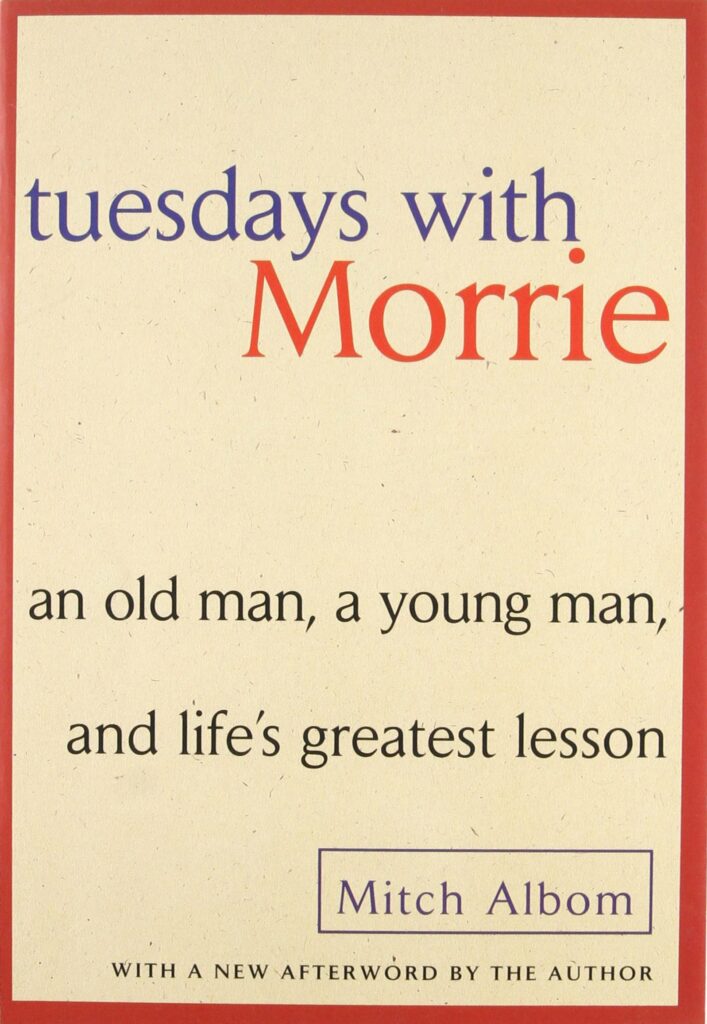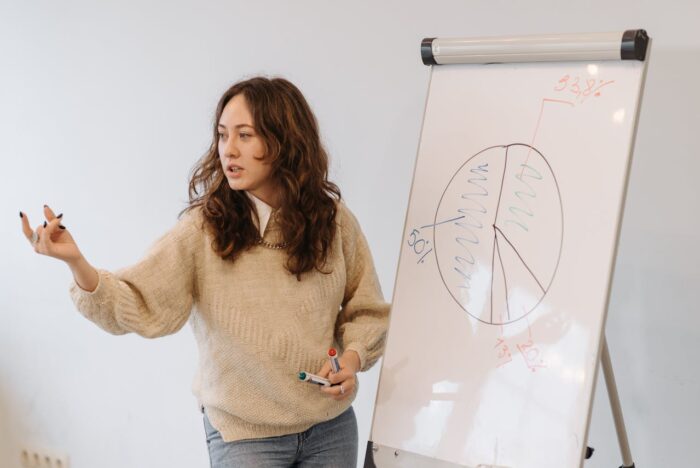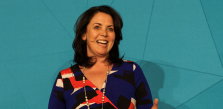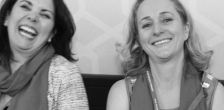
One of those for me is Tuesdays with Morrie.
A few years ago, it had been sitting on my bedside table unread for many, many months — a constant reminder of my intention to fill myself with new ideas and inspiration. An intention that usually goes unfulfilled until the holidays, when I load myself up with a stack of books and devour them like there’s no tomorrow. The holiday season is my time to recharge.
This particular book put words to something I had sensed for years but couldn’t quite put my fingers on…
And that is that teaching is the highest art form there is.
I’ve been a professional writer, photographer, speaker, designer, and documentary filmmaker in my lifetime, but none of those can touch the impact I’ve had as a teacher.
Teaching is essentially the art of sculpting raw human potential. And — unlike sculpting clay — you can’t control and can only suggest.
The best teachers lead students to their own realizations and, ultimately, render themselves obsolete.
Perhaps that’s why teaching is so often dismissed as a thankless, low-paid profession. And perceived as, well, teacherly.
But what if you could become one of the most highly paid teachers in the world?
Like Oprah.
Or even Warren Buffett.
Why are those teachers paid so well when the average teacher in the U.S. makes just $63,645?
Those teachers instinctively teach at the transcendental level.
Let me share what I mean by that.
Years ago, my mentor Brendon Burchard taught me what he called the 4 levels of teaching:
- the theoretical
- the tactical
- the transformational
- and the transcendental
The theoretical is the stuff of academics. You know, pie in the sky theories of how things work on a very high level.
So how many people want to pay top dollar for theoretical teaching?
Let me answer that by asking you another question: How many rich academics do you know?
Not a whole lot, right?
They’re fairly universally middle class.
They’re so fixated on their theories and philosophies that they often forget to relate those theories and philosophies to people’s everyday lives.
That’s the biggest reason why I ditched my plans to follow in my mom’s footsteps and become a professor. Instead, I wanted to make a real-world impact on people’s lives.
Now the next level of teaching is the “tactical” level — or the actual “how-to,” “step-by-step”, “nuts-and-bolts”…
That’s valuable to people, right?
Not so fast.
Think about the millions of how-to videos you can watch for free on YouTube — there are 779,000,000 results for the term “how to”. These videos are a dime-a-dozen, and you’re probably not going to add a huge amount of value to anyone’s life if you just start pumping those out.
Tactics alone aren’t life-changing. They don’t inspire people into sustainable action.
If they did, then everybody who learned a new diet plan would stick to it until they achieved their weight loss goals. But, the truth is, it’s not the diet plan; it’s not the nuts and bolts that motivate someone into life-changing action.
So what is it?
Well, our third level of teaching is the “transformational” — and that’s where you make the connection between your content and the change your audience wants to see in their lives.
When you connect that diet plan to looking good, feeling better, increasing your confidence and energy, then all of a sudden, that diet starts to get a little bit more interesting because you’re sharing the benefits. You’re answering the all-important question of “so what, why does this matter?”
While that’s super important, the transcendental level is where the real magic happens.
When you get into the realm of the transcendental, you can actually lift people up and connect them to their meaning and purpose — to the change they want to see in the world.
This is where you connect that diet plan to being the best version of yourself for your family — to being fit so you can be a model of health and vitality for your son and know that you can keep up with him as he grows — not just today — but when he graduates from college, gets married and has his own kids.
This is where you connect that diet plan to looking good and having confidence so you can attract a life partner who loves you for who you are and wants to take you to bed every night.
This is where you connect that diet plan to having the energy you need to do what matters most to you in the world and make your highest contribution. Getting that promotion at work, or writing that book, or starting that business.
And this is when people run to join your tribe and spontaneously coalesce into a movement of motivated people spreading the word — not for gain or payment or commission — but because they must.
You see, each level of teaching is more valuable and valued than the next in that people are willing to pay more money for it…
So why is that?
In 1999, the futurist Rolf Jensen said we’re moving away from an Information Society and into a Dream Society that values imagination over information.
The best teachers go beyond the content or information of their topic and awaken the imagination and potential of their students — just like Morrie did with his biographer Mitch Albom.
This brings me to this quote I found in the middle of Tuesday’s with Morrie:
“A teacher affects eternity; he can never tell where his influence stops.” – Henry Adams
Then, as I kept reading, I came across this scene:
– “I decided what I wanted on my tombstone,” he said.
I don’t want to hear about tombstones.
– “Why? They make you nervous?” I shrugged. “We can forget it.”
No, go ahead. What did you decide?
Morrie popped his lips. “I was thinking of this: A Teacher to the Last.”
He waited while I absorbed it.
A Teacher to the Last.
– “Good?” He said.
Yes, I said. Very good.
Then this final scene on the last page of the book:
After Morrie died, I went through boxes of old college material. And I discovered a final paper I had written for one of my classes. It was twenty years old now. On the front page were my penciled comments scribbled to More, and beneath them were his comments scribbled back.
Mine began, “Dear Coach…”
His began, “Dear Player…”
For some reason, each time I read that, I miss him more.
Have you ever really had a teacher? One who saw you as a raw but precious thing, a jewel that, with wisdom, could be polished to a pro shine? If you are lucky enough to find your way to such teachers, you will always find your way back. Sometimes it is only in your head. Sometimes it is right alongside their beds.
The last class of my old professor’s life took place once a week, in his home, by a window in his study where he could watch a small hibiscus plant shed its pink flowers. The class met on Tuesdays. No books were required. The subject was the meaning of life. It was taught from experience.
The teaching goes on.
So take a moment and celebrate teachers with me.
Mitch calls teachers “our most precious resource” and I believe they’re also our most unsung heroes.
Let me know: Who is your all-time favorite teacher and what did you learn from them?
Love it? Hate it? Let me know...
-
Great article. Articulates the trajectory of my teaching career–which leads me to wonder whether teachers actually go through all four stages themselves. Maybe the transcendental stage is where you end up if you keep digging deeper and deeper as a teacher, ever trying to discover the key to delivering real results and serving your students.
-
That makes sense Mary. I think we all start out just teaching the topic… and then realizing how much more there is to share!
-
-
Great insight Mary. I’m not sure every teacher makes it to the transcendental stage, but perhaps many of them do.
-
My maths teacher wrote in my autograph book on school final day, “Glory of life is to serve, not to be served”, he stands to my fav teacher till today, I am an early childhood educator.
-
So, so true. What an amazing message. Thanks for sharing!
-
-
This article is indeed very loaded and has inspired me to continue to aspire to be a transcendental teacher. I have missed the benefits of having close mentors and I want to be one to some younger people to give them what I missed. Thank you for sharing.
-
That’s terrific, Kingsley. Being a mentor is so rewarding.
-
-
Thank marisa
-
I deeply admire you and your ideas, but I do take issue with the sentence, “The theoretical is the stuff of academics. You know, pie in the sky theories of how things work on a very high level.” When properly situated or contextualized, theory does, when properly situated and contextualized, provide a useful history & foundation, the bigger picture (or the why), and framework to approaching a problem and “solution.” That is, theory, in and of itself, is not the culprit. Like any human-made construct, theory is flawed, but I would be careful about making such a sweeping generalization about the utility of theory. Indeed, however, you are right on point with your comment that no one wants to pay $ to only be taught about theory. For example, if I am taking an online course about speed walking and energy, I do not need to necessarily know or memorize who popularized speed walking or when the name was coined. Yet if there is a popular speed walking technique named after the “creator” and the name and history are key to understanding how to implement this technique, then what most people label as “theory” is important. Finally, and this is really a summation of my points here, many people make assumptions about “theory”: that it is ethereal, no basis or grounding in reality, and so on, when, in reality, what most people mean is simply “irrelevant information.” The latter has no place in any learning journey. Apologies if I am being too theoretical, LOL 🙂
-
Thanks for sharing Kelly and you are absolutely right. Theory is hugely valuable. I have a BA from Brown University in Semiotics — the theory of cultural symbols and signs, which has always allowed me to look below the surface of things.
Theory has a lot of value and I didn’t mean to be dismissive of it. My real point is that theory comes alive when you add the tactical, transformational and transcendental on top of it.
I also think transcendental without the theoretical or tactical attached to it can be equally pie in the sky (i.e. not applied to real world change).
It’s about combining all 4 levels together.
I have a lot of “theories” about education and product creation — for example my Experience Formula — that I then teach at the tactical level, while tying to the transformation people want in their lives and their world. Theory often provides the foundation for action.
-





























Leave a Comment